Over the course of 10 years, the RIPE NCC Academy has evolved into a hub for all the various training and certification services made available to the Internet community by the RIPE NCC.
Part of the RIPE NCC's mandate towards the RIPE community since its early days has been to provide training for the purpose of building a stable and resilient Internet based on best practices. Since 1995, we have been accomplishing this by organising in-person training courses all over our service region.
But it’s impossible to send trainers to every corner of our service region on a frequent basis. Trainer resources are limited and while we do our best to bring our courses to as many community members in as many countries as possible, there's only so much we can do.
To remedy this, a little over ten years ago, we started to look at what it would take to create a platform that would be available 24/7 to anyone who wanted to learn from the RIPE NCC.
The RIPE NCC Academy
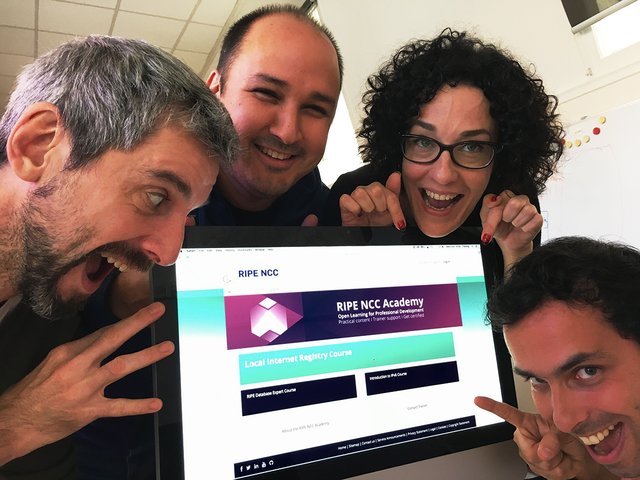
Towards the end of 2013, we started work on designing an online training platform. The main goal was to make our training content available to the community at large, but we also wanted to make it easier for participants to contact RIPE NCC trainers for specific questions regarding RIPE matters.
By November 2014 at RIPE 69 in London, we were ready to introduce the community to the RIPE NCC Academy.
Learning 101
To get the RIPE NCC Academy running, we needed an LMS (Learning Management System) in which to create our e-learning courses. We wanted something that: we could work with right away (without the need for new skills in front-end development); would support a rich variety of training modules (practical activities, quizzes and completion tracking, etc.); and would allow the integration of RIPE NCC Access in the login flow. We also wanted to avoid a hosted solution that would only increase costs for ongoing maintenance.
Our choice was Moodle, a well-known, widely-used, open-source LMS that we could run on our own servers and that had strong community support behind it. This is still the engine behind the RIPE NCC Academy today.
Another question we faced was where to start in terms of content. After some deliberation, we decided it would be great to give our learners a way to practice the skills we taught in our RIPE Database course, offering them activities linked to the RIPE Database training environment. The RIPE Database course was therefore the first e-learning course available when we launched the RIPE NCC Academy in 2014.
We followed this up in 2015 with the Introduction to IPv6 course and, in 2016, the Local Internet Registry course. With each new course, we continued to adapt the platform to our content and to customise it in ways that have provided the best user experience possible.
Evolution of the UI and focus on user experience
As RIPE NCC branding and www.ripe.net evolved throughout the years, so has the Academy UI, mostly following the ripe.net main look and feel.

At a certain point we saw the need to increase the user experience provided to our students with more interactive and visual content. To make this happen, we recruited our Learning Designers. From then on, Subject Matter Experts (SMEs) have been able to focus on the main content while our Learning Designers have focused on applying design methodologies and best practices for learning across our courses. In aid of this, we started using supporting frameworks to Moodle, such as Articulate Rise.
As a result, our courses took a different format, becoming more visually appealing and user-friendly. In 2020, the RIPE Database course was redesigned, followed by the IPv6 Fundamentals. Our IPv6 Security and BGP Security courses were also added that year. More recently we expanded the content to cover non technical topics such as Internet Governance and Introduction course for RIPE Working Group Chairs.
RIPE NCC Certified Professionals and learning design
The redesign, marked on the timeline below, coincided with the release of our certification platform, RIPE NCC Certified Professionals. This marked a major turning point not only in how the Academy looked, but also in the way our training content was developed.
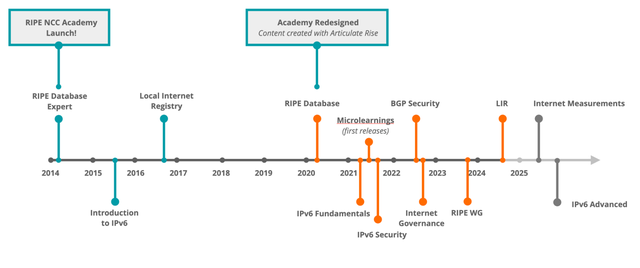
Providing online exams meant that all the content we deliver, across all the different modalities we deliver it in (e-learning, face-to-face, webinar), would always need to be in sync with the exams. Each course was no longer developed as a separate element, but rather as a piece of a larger system. Our e-learning content became the main resource to prepare for an exam and the main supporting resource for the face-to-face and webinars.
At the same time, the Academy Dashboard evolved from a 'list of courses the learner happened to be following' to a touchpoint for the certification platform, where students could claim their exam vouchers and see which badges they'd achieved so far. These badges - attained by passing the RIPE NCC Certified Professionals exam - were now the only learning certification issued by the RIPE NCC.
Microlearnings
Since the beginning, our e-learning content has been structured around full e-learning courses, covering a whole topic in detail. But we wanted the RIPE NCC Academy to deliver byte-size explainers on more practical topics which wouldn’t necessarily fit a major subject, and where a learner could go through in a short time.
We then released smaller independent modules, Microlearnings. These covered more practical and more technical subjects, such as how certain tools work (ping, traceroute) or the processes behind Packet Switching, for example.
Virtual Labs
For some time we had received suggestions to include virtual labs as part of our e-learning courses. In our live sessions, both in-person courses and online webinars, we created virtual labs where participants could carry out training related activities throughout the duration of the session. We wanted to bring this feature to our e-learning courses as well.
Upon the development of the IPv6 Security course we took the opportunity to investigate and implement this possibility. The big challenge here was to enable a lab that would be 24/7 available for everyone and be able to accommodate high peaks of users trying to do the labs (for example when we launch a course). This was achieved by creating a virtual lab that students can download and perform the tasks on their computer. Learners can then play with the tools and technology presented in the course but in a safe environment.
Central role
Today the RIPE NCC Academy sits very much at the centre of the RIPE NCC’s Training and Certification services.
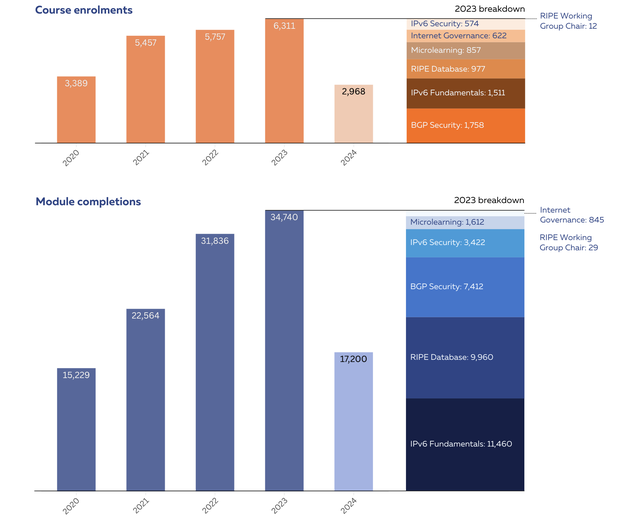
Offering seven main courses - including our LIR Fundamentals course launched this year - that cover over 100 modules and microlearnings, the platform continues to provide training to members of the community from every corner of our service region and beyond.
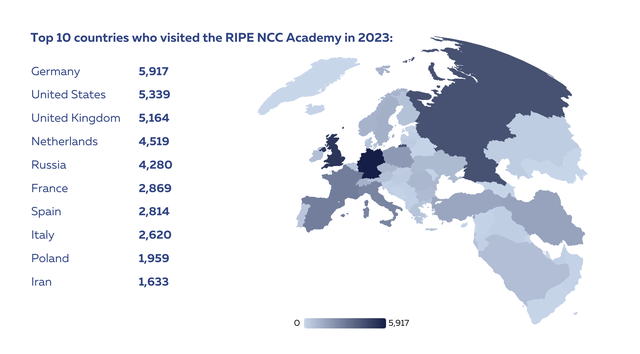
While we still deliver live webinars and face-to-face courses across our region, the RIPE NCC Academy serves as a hub for all these activities, a reliable learning resource that the Internet technical community can dive into at any time from anywhere, and the main resource to get prepared for RIPE NCC Certified Professionals exams.
What next?
We put a lot of work into getting feedback from our participants, and while we're very happy with the reaction our courses receive, there's always room for improvement!

One issue that we're aware of from the input we get is that it’s not easy to access all the different training content we provide, and also not clear how the different courses relate to each other. Therefore, we are unifying the different ways we offer learning content in the RIPE NCC Academy, making it easy for a student to find what they are looking for, regardless of which modality they prefer. We also want to present clearer Learning Paths where a student can follow a topic of their interest from the beginning to expert levels and the respective certification.
Beyond that, work on new content and expansion of the topics and learning resources we offer continues. The next courses we intend to publish in 2025 are Internet Measurements and IPv6 Advanced. Here's to another 10 years of learning and development!


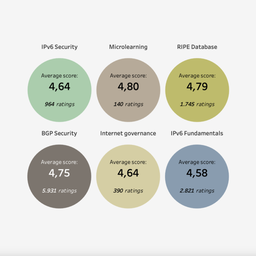

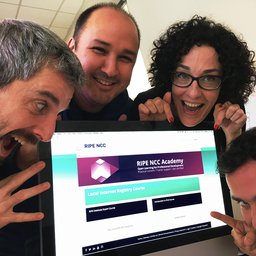
Comments 0
The comments section is closed for articles published more than a year ago. If you'd like to inform us of any issues, please contact us.